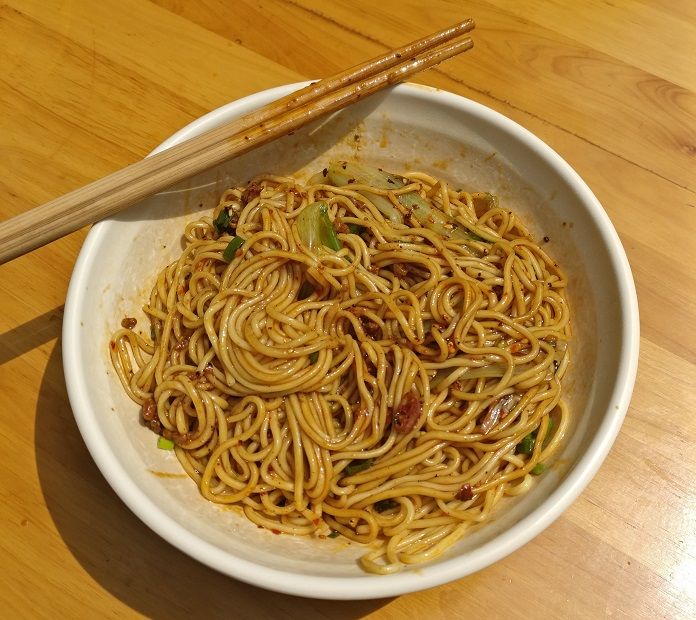City of Noodles

Dan dan mian and jazz. Chalk and cheese. Going to Jurassic Park and not getting eaten by dinosaurs. Some things just don't seem to go together. Or... do they?
Dan dan mian is a Sichuanese specialty: perfectly tender wheat noodles in a rich emulsion of sesame paste and chili oil with some green onions, preserved greens and minced pork. The 'dan dan' (担担) refers to the bamboo pole used by the original vendors, who used it to carry two delicious: one with sauce, the other with noodles. They would cry out 'dan dan mian!' as they walked, and the rest is history. Sadly for romantics, those bamboo-pole days are over, but happily for the rest of us, it's still wildly popular and can be found on most street corners in Sichuan. You can find it all over China, and Chengdu, done with varying amounts of care - but it's generally excellent. On a recent trip to Beijing, some of which I might write up later, I was surprised by Michelin-guide-recommended zhajiangmian (lit. 'fried sauce noodles', 炸酱面). I don't usually seek out Michelin fare, but it was half-coincidence and seemed a good endorsement. But what surprised me was how... well, mediocre it was. It was good, sure. But not, to my mind, as good as even a moderately well-executed bowl of dan dan mian.

My current favourite dan dan mian shop is a small joint, rarely very full, but with exceptional Dianping ratings (a Chinese everything-app. More on this in a later post). They get the noodle texture just right. It's not on Google maps, but I'll link the approximate location. It's called 面面小面 (mianmianxiaomian).
Jazz, you already know. Chengdu has recently been blessed with a surprisingly good jazz bar, not far from the center of town. Riverside Jazz Club is in Lan Kwai Fung, next to the Jinjiang River. Perhaps its biggest achievement is, well, feeling like a 'real' jazz club. The aesthetic is neon signs and red velvet curtains, candles on tables, good (if expensive - 98 RMB for cocktails) drinks. I imagine the rent for a multi-storey venue like this is not cheap, so all alcohol except house wines and cocktails seems to be only sold by the bottle. They seem to know their market: a surprising number of tables had half-drunk 1,000 RMB bottles of whiskey wreathed in shadow and pleasantly little cigarette smoke. How was the jazz? I've only been once, to a ticketed show (150 RMB early bird, 190 RMB door), but the standard was pretty high. Everybody knew what they were doing, the energy was palpable, and although the show timings were poorly-communicated, the amount of music for your renminbi was quite generous (9:30-10:40pm and 11-12:20am sets). According to the calendar there's music every night, with a ticketed show every week or so.
Most times you step out of a jazz club into the cool night, breathing deep of the fresh air. In a Chengdu summer, you walk from pleasant chill to sauna - even after midnight. It's somehow more stifling than even Singapore, which was prone to a cycle of buildup-and-release with regular tropical thunderstorms and relatively fast-moving weather patterns. Here, after rain, it's just more humid. But the climate here seems perfectly languid and oppressive, just right for afternoon siestas in the shade, sipping tea and playing mahjong. You begin to understand how the locals here seem so relaxed, so equanimous. I've been surprised by how little road rage, or, well, general public anger I've seen. Maybe it's a function of different expectations. When someone cuts you off in traffic back home, or does something socially unacceptable, there's generally collective agreement that that is a Bad Thing. Here, not so - the Overton Window of Socially-Acceptable Behaviour is very different. (The Overton Window, named for its inventor, is the window of acceptable political discussion, with views outside the window judged too extreme and immediately dismissed). But more on that in a later post.
So, yes, it turns out jazz and noodles go together very well indeed.